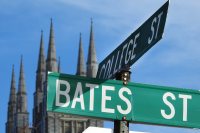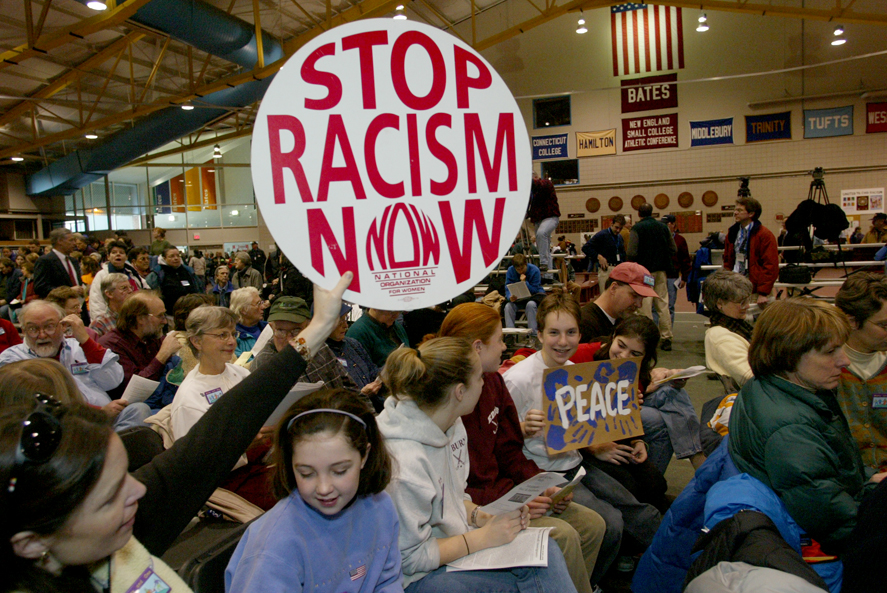
Harris Wofford to speak at dedication of Harward Center for Community Partnerships
Harris Wofford, chairman of America’s Promise, will be the keynote speaker at the dedication of the Donald W. and Ann M. Harward Center for Community Partnerships at 1:30 p.m. Friday May 24 on the historic Bates College Quad in front of Coram Library. In the event of rain, the dedication ceremony will be moved to Merrill Gymnasium.
In January 2002, Harris Wofford was named chairman of America’s Promise, an organization dedicated to building character and raising aspirations of the nation’s youth, and founded by U.S. Secretary of State Colin L. Powell. As a former U.S. senator from Pennsylvania and more recently CEO of the Corporation for National and Community Service, Wofford has dedicated much of his life to the goal of making citizen service a common expectation and experience for all Americans.
Wofford played a key role in both crafting and working to pass the trailblazing legislation that created AmeriCorps, the Learn and Serve America program and the Corporation for National and Community Service. He was an instrumental figure in organizing the 1997 President’s Summit for America’s Future, establishing America’s Promise.
Bates College announced the creation of a new Center for Community Partnerships last November to bring together service-learning and applied research in the community interest and to create a permanent structure for partnering with community projects. The naming and dedication Friday will honor a primary legacy of the Harward presidency: a commitment to community engagement by Bates College, according to Jill N. Reich, vice president for academic affairs.
“The Harward Center for Community Partnerships will become the college’s focal point for all partnerships with the community,” Reich said. “It will become the organizational home of Bates College’s highly effective and nationally recognized service-learning program. More than that, it is being organized as an academic program, in the heart of the institution, which underscores the commitment of the Bates College Board of Trustees to an enduring relationship between campus and community.”
Reich noted that the many existing relationships created through LA Excels and the Center for Service-Learning will remain operative. Eventually, the center will offer a single point of contact, making it easier for community members to approach the college with new ideas for relationships that have academic value and mutual benefit. The college plans to hire a director for the Harward Center during the next year.
The Harward Center for Community Partnerships will consolidate existing and new programs, current and future collaborations, personnel and resources.
* The center will enhance Bates’ focus on and support to service-learning. Service-learning at Bates goes beyond traditional volunteerism by incorporating community service into academic course work. Since 1995, more than half of the Bates student body has engaged in service-learning projects, while more than a third of the faculty has included a service component in their courses. In the year ending May 2001, Bates students participated in 53,547 hours of service in the local community. Bates’ service-learning program involves nearly 150 community agencies and institutions.
* The center will provide an ongoing institutional structure and resource for collaborations with the community, including LA Excels. A community-based strategic alliance founded in 1998, LA Excels is composed of colleges, schools, hospitals, municipal governments, arts organizations and businesses that work together to create a shared vision of excellence in community development. After two conventions involving more than 1,000 local citizens, LA Excels decided to champion plans that no single entity could accomplish, including: the development of a performing arts center, a community arts learning center, and a museum devoted to the area’s industrial and social heritage. It also supports an LA conference center, neighborhood housing improvements, green corridors and bicycle pathways linking the two cities, and projects to increase educational aspirations of local schoolchildren.
* The center will align and support research projects by students and faculty that have application in the community — research that brings external support that otherwise would not occur. Examples include a student who developed a Geographical Information System for Lewiston and Auburn and saved the municipalities nearly $200,000 in labor and consultants’ fees. Another gave 34 students from Lewiston’s Longley Elementary School a chance to conduct hands-on science experiments with four Bates professors.
Significant grant support from the Christian A. Johnson Endeavor Foundation and the Andrew W. Mellon Foundation provide resources that enable these college and community collaborations.
The Bates College Board of Trustees voted to create the center and authorized a search for its first director at its meeting last October. During board discussion, Trustees Chair Burton Harris, among others, noted the importance of a lasting partnership between campus and community. “The fences, physical and metaphorical, have come down,” Harris said. “The college and its partner, the community, now have a direct, a sustainable, and a mutually-reinforcing relationship.
“The establishment of this center, one of the most significant steps taken by the college, will assure the Lewiston-Auburn community that, as partners now and in the future, both the college and the community can reinforce their strengths, their mutually beneficial interactions and their missions of excellence.”




